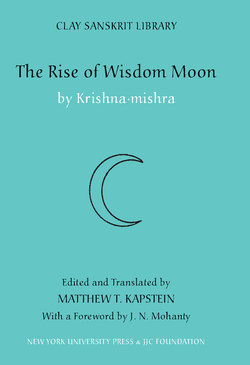Читать книгу The Rise of Wisdom Moon - Krishna mishra - Страница 28
На сайте Литреса книга снята с продажи.
ОглавлениеINTRODUCTION
Vishnu revealing that Upanishad is already pregnant with Scientia and Wisdom Moon. Upanishad then departs together with her husband Intuition. The Inner Man merges with Contemplation and, in his absorption, realizes that Scientia has taken birth and completed the conquest of Nescience. Wisdom Moon joins him on stage, they embrace joyfully, and the Inner Man praises Hail Vishnu for his good fortune. The goddess arrives, confirming that all that was to be done is now concluded. The play ends with final benedictions.
A Bit of History
To appreciate “The Rise of Wisdom Moon” more fully, we must consider some salient points of its historical, literary, and religious-philosophical background. The first was largely forgotten in India itself prior to the reconstruction of India’s pre-Islamic history as this emerged following the considerable archeological and epigraphical discoveries of the nineteenth century. Just how obscure the relevant history was prior to these developments may be gleaned from the dedication of Taylor’s 1812 translation, where we read:
Perhaps some conjecture may be formed concerning the age of the Play, from the mention which is made of the King Shri Kirti Varma, who is said to have attended its representation, along with his court. My Pandita, indeed, says, that he is a personification of the fame or glory of Gopala [the god Krishna]; but I am more inclined to think that he was a real personage, and that the poet, out of compliment or flattery, represents Gopala or Krishna as fighting his battles, and establishing him on the ________
xxvi
